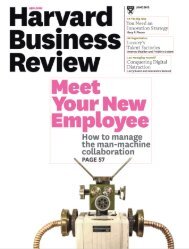+ + +
Create successful ePaper yourself
Turn your PDF publications into a flip-book with our unique Google optimized e-Paper software.
LEADERSHIP<br />
Successful<br />
leaders<br />
will be<br />
those who<br />
evaluate task<br />
completion<br />
rather than<br />
the individual.<br />
Employee surveys by both Harvard Business Review and<br />
PricewaterhouseCoopers have found that Millennial employees<br />
want a constant stream of review and recognition.<br />
“I was brought up in an environment of<br />
‘no news is good news,’” Erickson points out<br />
about the generational difference. “Feedback<br />
meant I was going to be judged in some<br />
way, usually negatively.” But for Millennials,<br />
“feedback is getting a tip. It’s coaching, and<br />
they want it multiple times a day.”<br />
That’s right—annual reviews, long a<br />
staple of corporate culture, don’t cut it anymore.<br />
Gen Yers want to know how they’re<br />
doing much more often—and the best<br />
leaders are finding ways to give it to them,<br />
through social media updates, peer evaluations<br />
or extensive mentorship programs.<br />
“The biggest complaint from Millennials<br />
about managers that I hear is, ‘My<br />
boss cancels my one-on-ones all the time,’”<br />
Orrell says. “They conclude, ‘Oh well,<br />
he doesn’t value my time.’ And the No. 1<br />
reason Millennials leave companies is that they don’t feel<br />
valued or respected.”<br />
Retention of Millennial employees has indeed proved<br />
problematic for companies whose older managers have<br />
failed to evolve beyond traditional corporate leadership<br />
strategies. Orrell and her firm spend most of their time<br />
counseling executives on how to help such managers<br />
work with their Millennial charges. “They tell me,<br />
‘There tends to be dissension and frustration on the<br />
part of our managers. How can we reduce the amount<br />
of friction in the workplace? How can we get everyone<br />
on the same page?’”<br />
Orrell is blunt. “People don’t leave companies; they<br />
leave managers,” she says. “They’re not mad at the<br />
building. They’re mad at who they work with on a dayto-day<br />
basis. We may have tolerated it for five to 10<br />
years. [Millennials] will tolerate it for five to 10 months.<br />
“Most people think the problem would be a 52-yearold<br />
who can’t relate to a 24-year-old employee, but<br />
that’s not typical,” she adds. “The biggest friction is with<br />
the 35-year-old Gen X middle manager who resents the<br />
whiney Millennial who needs hand-holding.”<br />
This is leading to significant changes at many<br />
companies, where savvy leaders are shaking up the<br />
long-stagnant management level. “Smart companies<br />
are getting really serious about this, stepping up their<br />
game with management, finally willing to go through<br />
the hassle of firing mediocre managers,” Orrell says.<br />
“Because if someone doesn’t like their boss, they’re<br />
gonna leave. The other stuff doesn’t matter.”<br />
ROB REUTEMAN IS A DENVER-BASED JOURNALIST<br />
WHO TEACHES BUSINESS REPORTING AT<br />
COLORADO STATE UNIVERSITY. @ROBREUTEMAN<br />
PHOTO © GETTY IMAGES/THOMAS BARWICK<br />
48 ENTREPRENEUR MARCH 2015






